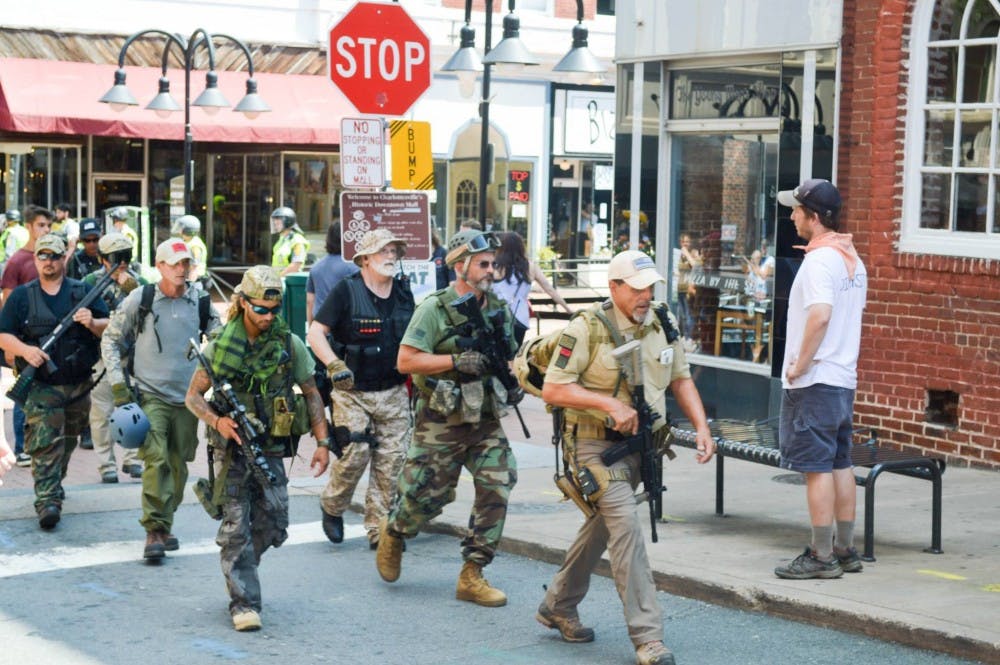The Charlottesville City Council held a special meeting Thursday morning when the Council voted to become a plaintiff in a lawsuit against organizers of the violent “Unite the Right” rally and private militia groups who were present during the demonstrations of Aug. 12.
A number of Charlottesville businesses and organizations are also plaintiffs in the suit, including the Champion Brewing Company, Mas Tapas and Maya Restaurant as well as the Woolen Mills, Little High and Belmont-Carlton neighborhood associations.
The suit, originally filed Oct. 12 in Charlottesville Circuit Court by the Georgetown Institute for Constitutional Advocacy and Protection, seeks to prevent the mobilization of private militia groups, such as those associated with the white nationalist “alt-right” and groups that proclaimed to be peacekeepers on Aug. 12.
Charlottesville law firm MichieHamlett will also be working with the ICAP to provide local guidance.
“[The] lawsuit is the culmination of an extensive investigation following the Unite the Right rally,” a fact sheet on the suit reads. “The investigation uncovered overwhelming evidence, much of which came to light only after August 12, of planning by alt-right groups to engage in militaristic violence. Review of hours of footage from the day’s events confirmed that these groups followed through on their plans. Heavily armed private militias stationed nearby made a volatile situation even worse.”
City spokesperson Miriam Dickler declined to comment on the decision of Council to join the lawsuit, citing active litigation of the case, though Mayor Mike Signer made a statement supporting the decision during Thursday's meeting.
“I support [the complaint] as a stand against the disintegration of our democracy, and as a call for us to put a firm close to this horrible chapter in our democracy where people think it’s okay to parade in military outfits in public, to openly threaten violence against other people, to fire weapons into crowds, to beat people in public and to use a car as a weapon,” Signer said. “This violence is all of a piece, and it can be stopped with the legal relief we are asking for under Virginia’s Constitution and our laws.”
The defendants in the suit include white nationalist rally organizers Jason Kessler and Eli Mosely, along with various white nationalist groups and individuals alleged to have participated in paramilitary activities. Two left-wing organizations are also named in the suit.
Hunter Wallace, a spokesman for a defendant in the suit, League of the South, argues that the presence of militia and paramilitary forces during the “Unite the Right” rally was necessary due to a lack of sufficient protection and security being provided by law enforcement personnel in downtown Charlottesville Aug. 12.
Some groups also claimed they were present to keep the peace at the rally.
According to Senior ICAP Litigator Mary McCord, multiple militia groups violated Virginia Constitutional law during the events of Aug. 11 and 12, as they were not granted express permission by government officials to legally organize as paramilitary units.
In an interview with The Cavalier Daily, McCord said the aims of the lawsuit and its legal justification are to obtain a court order prohibiting organized militia or paramilitary groups from returning to Virginia and engaging in paramilitary activity.
McCord also said that an unnamed Charlottesville business, a plaintiff in the lawsuit, was responsible for connecting the ICAP and City Council, resulting in the Council’s decision to join the suit.
According to McCord, the suit aims to validate a current Virginia law, which allows the state to control and regulate the activities of militia and military groups within the state’s borders.
“We seek to prevent private armies from coming back to Virginia that are not under the state's control,” McCord said. “[This is] truly about government's rights [and] ability to have a monopoly on legitimate use of force within the state, without having to worry about rogue target armies … I think that is what we saw on August 12.”
Looking forward, McCord said she believed that the current lawsuit could have potential implications for future court cases regarding the organization of militia and paramilitary units across the country.
“We think that this kind of tool for using state’s anti-military activity statutes could be used in other states where rallies are planned, and where it looks like … there might be a danger of paramilitary activity,” McCord said. “We’re in the midst of putting together a compendium of those laws in all 50 states, and those states could look to their laws … If those laws prohibit paramilitary activity, as it does in many states, they could also seek an injunction for the rally.”
Howard Evergreen, a board member of the Woolen Mills Neighborhood Association, said he hopes the organization’s involvement with the suit will bring an injunction to stop planned militia events in Charlottesville.
“One of our missions … is to represent our neighborhood and make it a safe place,” Evergreen said. “If people in our neighborhood are feeling unsafe, then part of our duty is to speak up, and clearly we had been hearing from neighbors, particularly from young black kids in the community, that they were feeling enormously afraid.”
Evergreen said he hopes the lawsuit brings peace to his neighborhood community that was rocked after the events of Aug. 11 and 12.
“It’s just so sad that when people in the community, particularly I know some of the black kids who live in my neighborhood, feel so afraid to go out at this point,” Evergreen said. “They don’t know what to make of it. I hate to think I live in a community where there is so much fear and that's why we joined into this [lawsuit].”
Full copy of the complaint:







